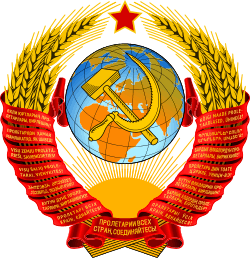Soviet of the Union
 |
| This article is part of a series on the politics and government of the Soviet Union |
|
Judiciary |
The Soviet of the Union (Russian: Сове́т Сою́за, Sovet Soyuza[1]) was one of the two chambers of the Supreme Soviet of the Union of Soviet Socialist Republics, elected on the basis of universal, equal and direct suffrage by secret ballot in accordance with the principles of Soviet democracy, and with the rule that there be one deputy for every 300,000 people. Until Glasnost and the 1989 elections however, only candidates approved by the Communist Party of the Soviet Union were permitted to participate in the elections. As opposed to the Soviet of Nationalities, the Soviet of the Union represented the interests of all of the people of the Soviet Union no matter what their nationality was.
The Soviet of the Union had the same rights and competence as the Soviet of Nationalities, including the right for legislative initiative.
The Soviet of the Union elected a chairman (who would lead the sessions of the chamber), his 4 deputies and permanent commissions: Mandates, Legislative Proposals, Budget Planning, Foreign Affairs, Youth Affairs, Industry, Transportation and Communications, Construction and Industry of Building Materials, Agriculture, Consumer goods, Public Education, Healthcare and Social Security, Science and Culture, Trade, Consumer Service and Municipal Economy, Environment.
The Soviet of the Union was effectively dissolved on 12 December, two weeks before the formal dissolution of the Soviet Union, when the Russian SFSR recalled its deputies, leaving it without a quorum. The legality of this action was questionable, since the Soviet Constitution did not allow a republic to unilaterally recall its deputies.[2] However, by this time the Soviet government had been rendered more or less impotent, and it was in no position to object.
See also
| English Wikisource has original text related to this article: |
| English Wikisource has original text related to this article: |
References
- ↑ Ukrainian: Рада Союзу; Belarusian: Савет Саюза; Kazakh: Одақ Кеңесі; Lithuanian: Sajungos Taryba; Moldovan: Cовиетул Униуний; Latvian: Savienības Padome; Estonian: Liidu Nõukogu
- ↑ The Russian SFSR has constitutional right to "freely secede from the Soviet Union" (art. 69 of the RSFSR Constitution, art. 72 of the USSR Constitution), but according to USSR laws 1409-I (enacted on 3 April 1990) and 1457-I (enacted on 26 April 1990) this can be done only by a referendum and only if two-thirds of all registered voters of the republic has supported that motion. No special referendum on the secession from the USSR was held in the RSFSR